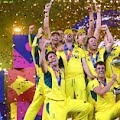SYDNEY: The head of the Australian Cricketers' Association says the form of the national team has deteriorated because of the players' fear of a public and official backlash against the "sledging" or verbal abuse of opponents.
Chief executive Paul Marsh told the Sydney Morning Herald that Australia's performance had worsened since players were warned to tone down their aggression after a bitter Test against India in Sydney in 2008.
Marsh said the Australian players had started "second guessing their natural instincts" and opponents had exploited their "weakness."
In a column in Tuesday's Herald, former Australia fast bowler Stuart Clark said the national team had suffered an "identity crisis" since the spiteful Sydney Test two years ago.
Frequent verbal clashes between Australian and Indian players soured the 2008 match and led to widespread criticism of Australia's behaviour.
India spinner Harbhajan was charged with verbal abuse after the match for allegedly calling Australia all-rounder Andrew Symonds a "monkey." No Australian players were charged and India threatened to boycott the remainder of the tour unless issues of behaviour were addressed.
Marsh said players were warned to tone down their on-field behaviour at a subsequent meeting with Cricket Australia, and their change in attitude had resulted in more timid performances.
"I think there's no doubt the team's performance has been affected," Marsh told the Herald. "Hard, aggressive cricket is in the Australian team's DNA, and unfortunately the players started second-guessing their natural instincts in the heat of battle for fear of reprisal from CA or a public backlash from the vocal minority.
"I know for a fact that many of the opposition teams were seeking to exploit what they now saw as a weakness in the Australian team."
Marsh said he was certain the fear of a public or official backlash against sledging had impacted on Australia's form.
"After the Indian Test in Sydney, CA called a meeting of all players, CA senior management, some board directors and myself to discuss the way the Australian team was playing the game and being perceived by the public," Marsh said. "There was a directive given by CA that the team needed to change its on-field behaviour. At the time many of the players disagreed with this directive. However, they took the feedback they were receiving on board and there was an immediate noticeable change in the way the team played the game.
"Unfortunately, the Australian cricket team was a victim of its own success. They were winning everything there was to win and all of a sudden this success wasn't enough for some people. The team had to not only win but win in a manner that was different from how the Australian cricket team had played over several decades. In my view, it was a classic tall poppy syndrome story and I said so at the time."
Cricket Australia spokesman Peter Young confirmed that a meeting occurred after the 2008 Test at which on-field behaviour was discussed.
"After Sydney, there was significant public backlash which surprised Cricket Australia and surprised the players, and I think it's fair to say that we went through a period of introspection," he said. "But the public has consistently told us since then, through three years of research, that they are totally comfortable with on-field aggression as long as it is hard but fair cricket.
"The public has told us for the last three years since Sydney that they understand that the elite playing field, Test cricket, is no place for the faint-hearted. But what the public doesn't like is on-field behavior which descends into personal vilification, certainly racial vilification, and sharp practice (cheating).














